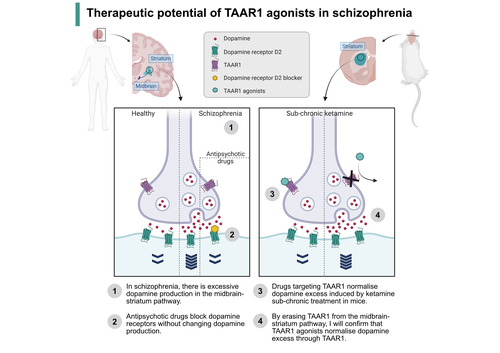
2023 Post-doctoral Clinical Fellowship
Therapeutic potential of TAAR1 agonists in schizophrenia
Dopamine excess in the pathway connecting two brain regions called midbrain and striatum is the hallmark of schizophrenia. None of the antipsychotic drugs that we have been using for 70 years target this core neurobiological abnormality. Instead, they block dopamine receptors to minimise the dopamine signal from being passed on to neighbouring neurons. Currently available antipsychotic drugs block the effects of dopamine throughout the whole brain, which can cause side effects like poor motivation, lack of enjoyment and pleasure, movement disorders, and weight gain. Trace Amine-Associated Receptor 1 (TAAR1), a receptor normally present in the brain, has become an increasingly attractive drug target because it can regulate dopamine production without dopamine receptor blockade. Our group has shown that drugs targeting TAAR1 normalise dopamine excess. However, it is not clear if they actually target the midbrain-striatum pathway, or if their effect is an indirect consequence of their actions in other brain regions. In this project, I will genetically erase TAAR1 from the midbrain-striatum pathway and look at the effects of this manipulation on dopamine production and release. I will then test if drugs targeting TAAR1 normalise dopamine excess in the midbrain-striatum pathway when TAAR1 is missing. These experiments will allow me to confirm if TAAR1 is a key modulator of the neurobiology underlying schizophrenia and therefore a promising target of innovative treatment strategies to treat this disabling condition.
